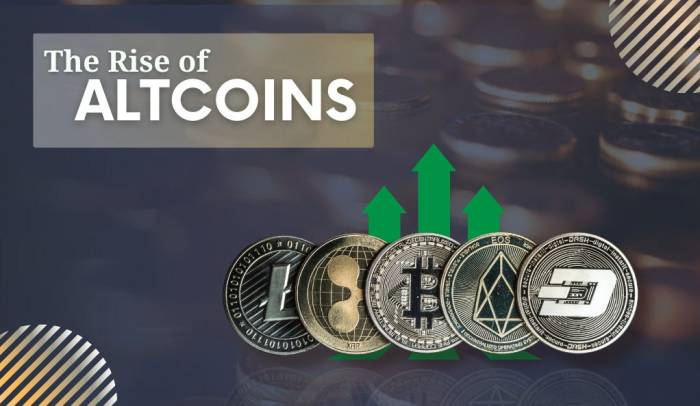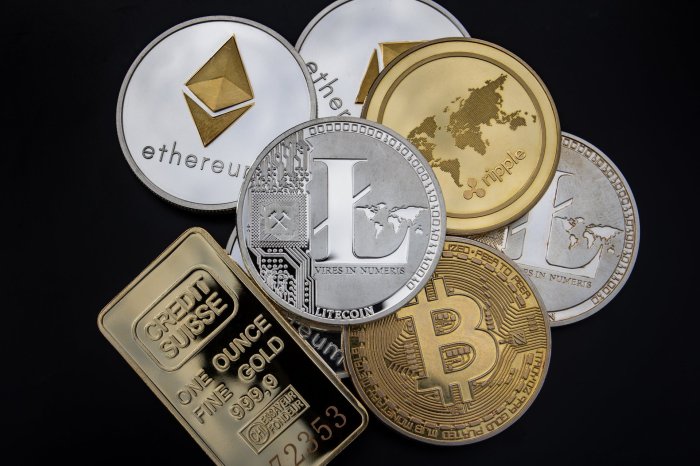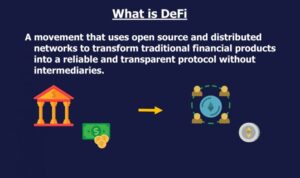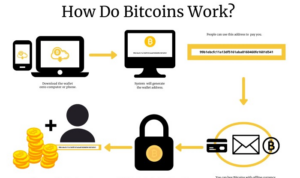The Rise of Altcoins in the Crypto Market sets the stage for this enthralling narrative, offering readers a glimpse into a story that is rich in detail with American high school hip style and brimming with originality from the outset.
Altcoins have been making waves in the crypto market, challenging the dominance of Bitcoin and paving the way for a new era of digital currency. As these alternative coins gain traction, it’s essential to delve into their origins, unique features, and potential impact on the market. Get ready to ride the wave of altcoin revolution!
Introduction to Altcoins

Altcoins, short for alternative coins, refer to any cryptocurrency other than Bitcoin. These digital currencies aim to provide alternatives to traditional fiat currencies and offer unique features and functionalities.
The Purpose of Altcoins in the Crypto Market
Altcoins serve various purposes in the cryptocurrency market, such as:
- Exploring different technological innovations and improvements compared to Bitcoin.
- Providing more decentralized and private transactions through advanced protocols.
- Offering specific use cases like smart contracts, decentralized finance, and non-fungible tokens (NFTs).
Origins and Differences from Bitcoin
Altcoins emerged following the success of Bitcoin, with developers creating new cryptocurrencies with distinct features. Some key differences from Bitcoin include:
- Different consensus algorithms like Proof of Stake (PoS) instead of Proof of Work (PoW).
- Unique mining processes and reward mechanisms.
- Varying supply limits and inflation models.
Factors Contributing to the Rise of Altcoins

Altcoins have been on the rise due to several key factors that have propelled their popularity and adoption in the crypto market.
Technological Advancements
Altcoins have leveraged technological advancements such as smart contracts, faster transaction speeds, and enhanced privacy features to attract users. These innovations address some of the limitations of Bitcoin, making altcoins more versatile and appealing for different use cases.
Catering to Specific Use Cases
Altcoins are designed to cater to specific use cases, offering features and functionalities that Bitcoin may not provide. For example, Ethereum’s smart contract capabilities have made it a popular choice for decentralized applications (dApps), while privacy-focused altcoins like Monero appeal to users seeking anonymity in transactions.
Increased Investor Interest and Market Acceptance
Altcoins have gained momentum due to increased investor interest and market acceptance. As more investors diversify their portfolios beyond Bitcoin, altcoins have seen a surge in demand and trading volumes. This heightened interest has contributed to the overall growth and success of altcoins in the crypto market.
Popular Altcoins in the Market

Cryptocurrency market is not just about Bitcoin anymore. There are several other altcoins that have gained popularity and are being widely traded in the market. Let’s take a look at some of the most well-known altcoins and compare their features and functionalities.
Ethereum (ETH)
Ethereum is a decentralized platform that enables developers to build and deploy smart contracts and decentralized applications (dApps). One of the key features of Ethereum is its ability to execute smart contracts automatically without the need for intermediaries.
Ripple (XRP)
Ripple aims to facilitate fast, low-cost cross-border payments. It offers a digital payment protocol that allows for real-time settlement of transactions. Ripple’s network is used by various financial institutions to improve their payment systems.
Litecoin (LTC)
Litecoin was created as a “lighter” version of Bitcoin, with faster transaction confirmation times and a different hashing algorithm. It is often referred to as the silver to Bitcoin’s gold and is used for peer-to-peer transactions.
Cardano (ADA)
Cardano is a blockchain platform that focuses on scalability, sustainability, and interoperability. It aims to provide a secure and scalable infrastructure for the development of decentralized applications and smart contracts.
Dogecoin (DOGE), The Rise of Altcoins in the Crypto Market
Initially started as a joke, Dogecoin has gained a significant following and is known for its active community and charitable initiatives. It is often used for tipping and as a form of digital currency for online transactions.
Unique Selling Points
Each altcoin mentioned above has its own unique selling points that differentiate it from others in the market. Ethereum stands out for its smart contract capabilities, Ripple for its focus on cross-border payments, Litecoin for its fast transaction speeds, Cardano for its emphasis on scalability, and Dogecoin for its community-driven approach and fun-loving nature.
Altcoins vs. Bitcoin: The Rise Of Altcoins In The Crypto Market
Altcoins and Bitcoin differ in terms of technology and utility. While Bitcoin was the first cryptocurrency created and operates on a decentralized peer-to-peer network, altcoins encompass a wide range of digital currencies that emerged after Bitcoin, each with its unique features and purposes.
Market Dynamics
- Altcoins offer various functionalities beyond just being a digital currency like Bitcoin. Some altcoins focus on privacy, smart contracts, or faster transaction speeds.
- Altcoins are often more volatile in the market compared to Bitcoin due to their lower market capitalization and liquidity.
- Altcoins can be more speculative investments compared to Bitcoin, as their value can fluctuate significantly based on market trends and news.
Potential for Altcoins
- Some altcoins have gained popularity and market dominance in specific niches, such as Ethereum in smart contracts or Ripple in cross-border payments.
- Altcoins have the potential to surpass Bitcoin in market dominance if they can offer innovative solutions to real-world problems and gain widespread adoption.
- As the cryptocurrency market evolves, altcoins continue to push boundaries and explore new use cases beyond what Bitcoin initially set out to achieve.



